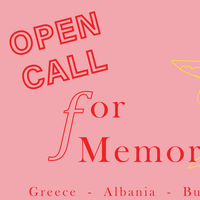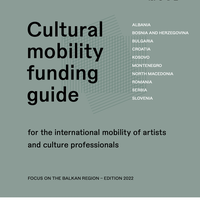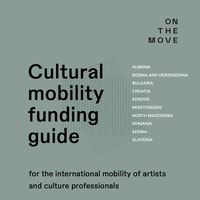Balkan Focus in 52nd Thessaloniki Filmfest

 One of the highlights of the 52nd Thessaloniki International Film Festival, running from 4 to 13 November 2011, is Balkan Survey, which includes eight full-length features in its Main Section representing the best new efforts from Romania, Bulgaria, Hungary, Serbia, Turkey, Bosnia, Croatia, and other countries.
One of the highlights of the 52nd Thessaloniki International Film Festival, running from 4 to 13 November 2011, is Balkan Survey, which includes eight full-length features in its Main Section representing the best new efforts from Romania, Bulgaria, Hungary, Serbia, Turkey, Bosnia, Croatia, and other countries.The films are Adalbert’s Dream by Gabriel Achim (Romania), Avé by Konstantin Bojanov (Bulgaria), Best Intentions by Adrian Sitaru (Romania-Hungary), Loverboy by Cătălin Mitulescu (Romania-Sweden-Serbia), Press by Sedat Yilmaz (Turkey), Punk’s not Dead by Vladimir Blazevski (FYROM-Serbia), The Enemy by Dejan Zečević (Serbia-Bosnia & Herzegovina-Croatia-Hungary), and The Island by Kamen Kalev (Bulgaria-Sweden).
The 10-day-long festival features films from all over the world, as well as Masterclasses, panel discussions and a other parallel events. The organizers seek to "transform the city of Thessaloniki into a place of discovery, a youthful beehive thriving on art, life and fruitful interaction, revolving around the 7th Art and the world of cinema."
From the Main Section notes by Dimitris Kerkinos:
This year the young Balkan filmmakers have come along to prove that, besides their talent and vigor, they are also able to narrate stories of universal relevance. Thus, drawing from the cultural reality of their homelands, they address a wide range of topics with man always at the center. In this way, they manage to capture the attention and the hearts of interntional audiences.
The universal character of their narratives, therefore, constitutes the common link between the majority of this year’s selection. In The Island, a romantic film of transcendence and liberation, Kamen Kalev combines reality with illusion in his hero’s atempt to discover his real self. In the other Bulgarian film, Avé, by Konstantin Bojanov, a love story/road movie, we meet two adolescents who have become alienated from society and who are searching for love and identity on a coming-of-age journey. Romania’s Cătălin Mitulescu also has teenagers as his protagonists in another love story, Loverboy. Set against a melancholy and derelict Danubian landscape, where the younger generation’s desire to have fun clashes with familial traditions, the director highlights the energy, intensity and emotions of youth through a self-destructive relationship of sexual exploitation. This major social and moral problem is touched upon with a superb aesthetic immediacy and without a trace of melodrama.
The conflict between generations also exists in Joshua Marston’s American-Albanian co-production, The Forgiveness of Blood. By perceptively addressing the problem of the vendetta in northern Albania and juxtaposing the contemporaneity of the old and the modern-day world, the American director chooses to focus on the impact this centuries-old tradition has on the younger generation. The family drama Best Intentions, by Adrian Sitaru, is born out of the protagonist’s mistrust of his country’s health system and tells us how even someone’s best intentions may lead to bad decisions. The subjective shots, showing us the other characters’ reaction to the hero, are often intercut with objetive ones, thus conveying the tension in the air. Equally human, and especially tender and moving, is the short film Superman, Spiderman, or Batman by Tudor Giurgiu, in which a five-year-old boy visits his dying mother in hospital. In Try not to Blink, also a short film, Radu Dragomir focuses on the awkwardness felt by a young man when he accidentally discovers the diagnosis of a pretty young woman he has just been flirting with.
Drawing on the experiences of journalist BayramBalci and “starring” the daily Özgür Gündemdaily newspaper and its offices in Diyarbakir in the nineties, Sedat Yilmaz’s Press transcends the local reality of that era and talks about freedom of the press, the responsibility of journalists towards social problems, as well as the concept of truth – as opposed to the truth of the news.
The metaphysical thriller The Enemy, by the Serb filmmaker Dejan Zečević centers on the civil war in Yugoslavia, approaching war and violence as a product of human absurdity and as a feature of any human military conflict. Without giving answers, this claustrophobic film portrays the complexity of human psychology in wartime, when the slightest provocation can become a demon of evil and destruction.
The rest of the films revolve around issues that are more Balkan. Punk’s Not Dead, by FYROM’s Vladimir Blazevski, a darkly humorous, low budget road movie, addresses, through the story of the reunion of a punk rock band, the problem of nationalism, thus belying the regime’s rhetoric that presents a country without ethnic tensions. Another black comedy is Adalbert’s Dream, by the Romanian Gabriel Achim, based on a true story that casts a critical eye on the Ceauşescu regime. The story of the reenactment of a work accident in a factory which causes an identical accident – on the anniversary of the founding of the Romanian Communist Party and a day after Steaua Bucharest’s winning of the Champions League – is brought to the screen through old-fashioned video technology.
Two more short films from two especially talented filmmakers complete this year’s program. Both are tragicomedies: Like a Dog in a Vineyard, by Kosovars Yll Çitaku and Driton Hajredini, is set during the war of 1999 in Kosovo; and Bora Bora, by Bogdan Mirica, takes place in the Romanian countryside.
Similar content
By Kerrine Goh
25 Jun 2007
By Kerrine Goh
25 Jun 2009
deadline
25 Oct 2022
posted on
08 Jan 2022
posted on
08 Feb 2018



